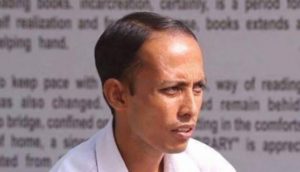By Kamran Reza Chowdhury on Jul 06, 2018
A Bangladesh man returned to Dhaka on Friday nearly a decade after he left for India to visit the Taj Mahal in July 2008, only to end up in prison on a murder conviction the Bangladeshi government said he could not have committed.
After serving almost 10 years in an Indian prison, Badal returned to Bangladesh on Friday as part of a repatriation program between the two countries, officials said, but he was sent straight to a cell at Dhaka Central Jail despite Bangladesh’s efforts nearly five years ago to free him from Indian custody.
“Two police officers from Bangladesh went to India and got Badal back to Dhaka. Badal has to serve the rest of his sentence period in Bangladeshi prison,” Munim Hasan, joint secretary at the Bangladeshi Ministry of Home Affairs, told BenarNews.
Because he carried proper documents including a visa in July 2008, Badal Farazi did not expect to be arrested by the Border Security Force as soon as he entered India, on a charge that he had murdered a woman in Delhi two months earlier. Unable to speak Hindi or English, Badal, now 28, could not defend himself and ended up being convicted and drawing a life sentence in India, his sister said.
“Without committing any crime, my brother served 10 years in prison,” Taslima Beguam told BenarNews. “He won’t get those 10 years back. He is innocent. Why he has to be in prison again? He should be granted clemency.”
In December 2012, Bangladesh’s High Commission in New Delhi sent a letter to the Indian government to plead for Badal who it said had been “falsely implicated” in the May 5, 2008, murder of an elderly woman in her Delhi home. The letter stated that Badal’s passport was stamped with the Indian T visa two months later.
“It is to note that the HCI (High Commission of India), Dhaka, confirmed the issuance of a visa for him, Bangladesh confirmed the date of his entry into India and the School authority of Badal confirmed his presence in School during the commission of the offense in India & all these events substantiate his innocence,” the Dec. 17, 2012, letter stated.
Salauddin Noman Chowdhury, the former deputy chief of Bangladesh’s High Commission in India, told BenarNews that once the embassy learned of Badal’s innocence, it went to the Indian court to plead for him but was not successful. The main suspect in the case, Badal Singh, has absconded.
Supreme Court turns down appeal
In May 2016, the Delhi High Court confirmed Badal Farazi’s life sentence, the Times of India reported. His appeal to the Supreme Court was dismissed in December 2016, meaning the life sentence stands.
Following the court ruling, the Bangladesh government used the extradition treaty with India that requires Badal to serve out his sentence in his home country. Munim, the joint secretary of Home Affairs, said Badal was the first Bangladeshi citizen returned under this treaty.
Rahul Kapoor, a social worker in Delhi, created a social media campaign seeking to extradite Badal Farazi to Bangladesh after meeting him in 2016 on a work-related assignment.
After Badal told him about how he was falsely implicated and convicted in a murder case, Rahul led a demonstration in Delhi calling for his freedom.
“I started my work in Tihar jail as a part of my academic work and there I met Badal,” Rahul wrote on social media, saying the case could be made into a Bollywood film.
Educational opportunities
Badal has made the most of his time behind bars, according to officials at Bangladesh’s Ministry of Foreign Affairs, noting he could speak Hindi and English fluently.
In addition, he completed secondary and higher secondary school certificate exams and received an honors degree from the Indira Gandhi Open University, along with completing diploma courses in eight subjects.
The neighbors signed the extradition treaty in January 2013 and it could be used to transfer Bangladesh citizens incarcerated in in the Indian state of West Bengal.
“We have already written to the central government for their repatriation under the extradition treaty between the two countries,” West Bengal Minister of Corrections Ujjal Biswas told BenarNews.
As of April 2016, 1,513 Bangladeshis who have been convicted of crimes in West Bengal prisons and another 1,768 facing charges, according to the prison department’s website.
“Though there is a treaty between two countries, it’s not fully effective. I think the treaty should be used effectively,” he said.
Paritosh Kanti Paul in Kolkata contributed to this story.

